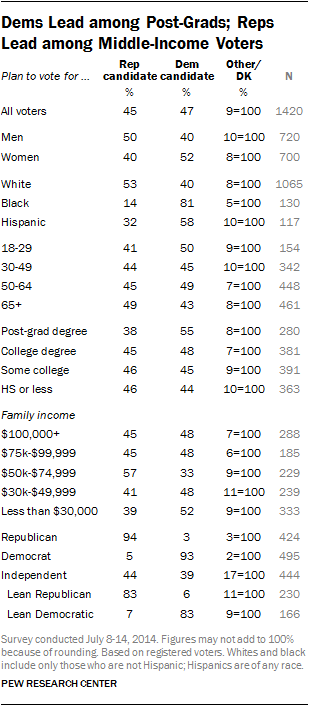
With four months to go before the 2014 midterm elections, the preferences of registered voters are about evenly divided: 47% say they plan to vote for the Democratic Party’s candidate in their district, while 45% say they plan to back the Republican Party’s candidate. There has been little change in voter preferences over the four previous Pew Research Center surveys measuring 2014 midterm voting intentions.
There are wide gender, educational and income differences in voter preferences. Republicans currently hold a 10-point lead among men (50% to 40%), while Democrats have a 12-point advantage among women (52% to 40%).
In recent elections, voters with post-graduate degrees have emerged as reliable Democratic voters: In the current survey, 55% of voters with post-graduate degrees favor the Democrat in their district, or lean Democratic, while 38% support the Republican or lean Republican. Voters with less education are evenly divided.
Middle-income voters – those with family incomes between $50,000 and $74,999 – favor the GOP candidate by a wide margin (57% to 33%). Democrats hold a 13-point advantage (52% to 39%) among voters with incomes of less than $30,000, while voters in other income categories are divided. (For a closer look at midterm vote preferences, see the detailed table that accompanies this report.)
More Enthusiastic than Usual about Midterm Vote?
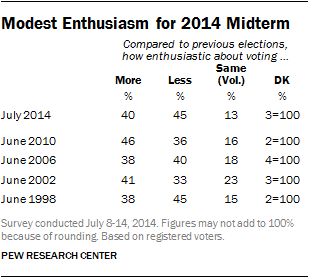
Overall, 40% of voters say that they are more enthusiastic about voting than in previous midterm elections, however, at least as many (45%) say they are less enthusiastic than usual; 13% volunteer that they feel the same about voting in this congressional election as in previous ones.
The percentage saying they are less enthusiastic about voting than usual is as high as it has been since 1998, in the midterm elections held in Bill Clinton’s second term, following the scandal surrounding his affair with Monica Lewinsky.
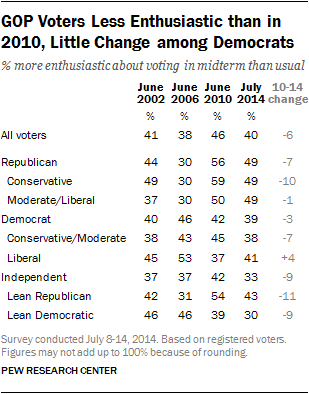
At this point in the 2010 elections enthusiasm was stronger: 46% said they were more enthusiastic about voting, while fewer (36%) said they were less enthusiastic.
About half of Republican voters (49%) say they are more enthusiastic about voting this year than in the past, compared with 39% of Democrats. While Republicans maintain an enthusiasm gap over Democrats, the size of this advantage is more modest than in 2010.
Conservative Republicans are 10 points less likely to express greater midterm voting enthusiasm today than in 2010 (49% vs. 59%). By contrast, 41% of liberal Democrats say they are more enthusiastic than usual about voting in the 2014 midterms; in 2010, 37% said this.
Enthusiasm among independents is lower today than in 2010 (33% vs. 42%) and has ticked down among both Democratic-leaning and Republican-leaning independent voters.
Party Control of Congress a Factor in Midterm Vote
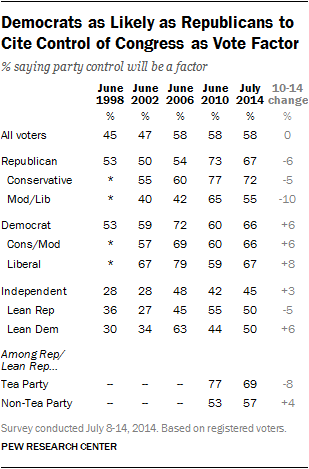
Nearly six-in-ten registered voters (58%) say the issue of which party controls Congress will be a factor in their vote this fall. This percentage is identical to opinion in June of 2010 and 2006. More say party control is an issue for them at this point in the 2014 midterm cycle than said this in the summer of 2002 (47%) and 1998 (45%).
In the current survey, about equal percentages of Republican (67%) and Democratic (66%) voters say party control of Congress will matter to their vote. This marks a shift from 2010 when more Republicans (73%) than Democrats (60%) cited control of Congress as a factor in their vote.
Independents are less likely than Republicans and Democrats to say they will consider party control of Congress in their vote: 45% say this will matter to them, while 52% say it won’t.
More Say Vote Is Against – than For – Obama
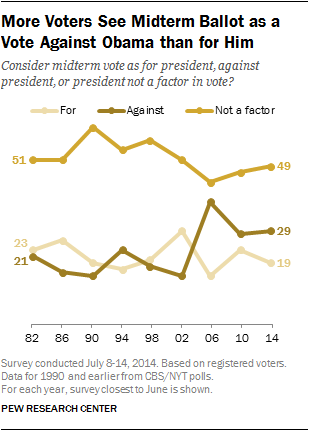
About half of voters say Obama will be a factor in their vote this fall, with somewhat more saying they consider their ballot a vote against Obama (29%) than for him (19%); 49% say the president won’t be much of a factor in their decision. Opinion is little changed from April of this year.
In June 2010, opinion was similarly distributed: 28% considered their vote as a vote against Obama, 23% a vote for him and 47% said he wasn’t much of a factor.
While more say they will cast their midterm ballot as a vote against, than for, the president, opinion is not as negative toward Obama as it was toward George W. Bush in 2006.
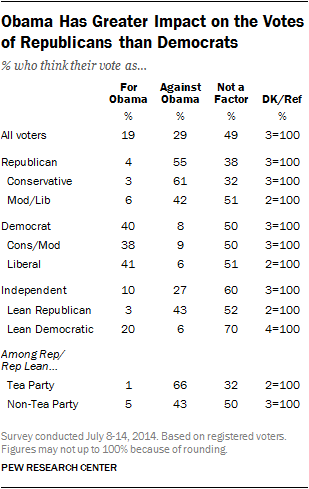
Eight years ago, 38% of voters said they were voting against Bush with their midterm vote, compared with just 15% who said they were voting for him.
A 55%-majority of Republican voters say they think of their vote for Congress as a vote against Barack Obama, including 61% of conservative Republicans. A smaller percentage of Democrats say they consider their midterm vote as one for Obama: 40% say this, with little difference in the views of liberal Democrats and conservative and moderate Democrats.
In 2006, Democrats were even more likely to cite opposition to Bush as a factor in their vote than Republicans are to say this about Obama today. Eight years ago, 65% of Democratic voters considered their midterm ballot to be a vote against Bush, as did 39% of independent voters.
High Anti-Incumbent Sentiment – Among Both Parties
At this point in 2014, anti-incumbent sentiment is as high as it has ever been in midterm elections dating back to 1994.
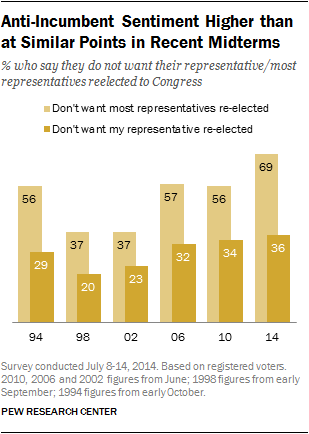
Overall, 36% of voters say they do not want to see their own representative reelected to Congress, while 48% say they would like to see them win reelection. In the wave elections of 2010 and 2006, the percentage wanting their own representative to be unseated stood at 34% and 32% in June of each year.
In addition, fully 69% say they do not want most members of Congress to be reelected this year; just 24% say they want them back. In June of 2010, 56% wanted to see most members of Congress lose their jobs; in June of 2006, 57% of voters said this.
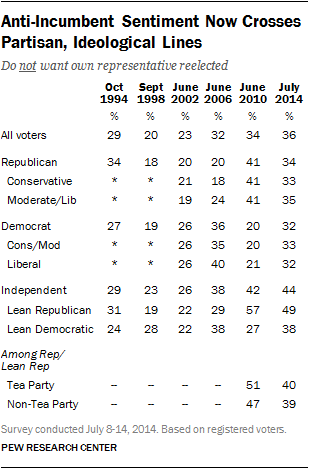
The current anti-incumbent sentiment is being driven by voters across partisan groups. About equal percentages of Republicans (34%) and Democrats (32%) say they do not want their own representative reelected to Congress. Independents (44%) are even more likely to take this view.
This stands in contrast to 2010, when Republicans were much more likely to express anti-incumbent views than Democrats, and 2006, when Democrats were more likely to want their representative to change.
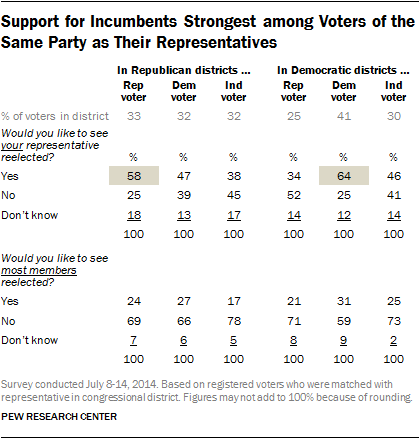
Those living in districts represented by a member of their own party are, perhaps not surprisingly, more likely to support their member’s reelection. In districts with a Republican congressperson, nearly six-in-ten Republicans (58%) want to see their representative reelected, compared with 25% who do not. In districts represented by a Democrat, 64% of Democrats want to see the incumbent win and 25% do not.
Voters represented by someone of the opposite party are less supportive of their incumbent congressperson. Still, nearly half (47%) of Democratic voters in Republican-represented districts say their lawmaker deserves reelection. That compares with just 34% of Republican voters in districts represented by a Democrat.
Factors Driving 2014 Vote Choice
Voters view national issues as their top concern when it comes to factors influencing their midterm vote.
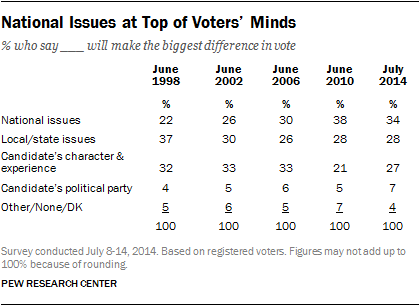
Overall, 34% say national issues will make the biggest difference in their vote for Congress, while slightly fewer name local and state issues (28%) or a candidate’s character and experience (27%). Very few say they will be voting primarily on a candidate’s political party (7%).
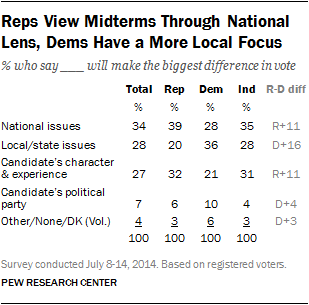
The factors influencing voters’ midterm choice in 2014 are similar to those registered in the summer of 2010, when voters also viewed the election through a national lens. In 2002 and 1998, there was relatively more emphasis on state and local issues and a candidate’s character and experience.
Nearly four-in-ten Republican voters (39%) say national issues will make the biggest difference in how they vote for congress this year, compared with fewer (28%) Democratic voters. Similarly, more Republicans (32%) than Democrats (21%) cite a candidate’s character and experience as the top factor informing their vote.
Democrats are more likely than Republicans to say their vote will be most influenced by state and local issues (36% vs. 20%).
Engagement Indicators Favor Republicans
At this stage of the 2014 election campaign, Republicans hold an all-important engagement edge over Democrats. Overall, 77% of Republican voters say they are “absolutely certain” to vote in the election this November, compared with somewhat fewer Democratic voters (70%) who say the same. Republicans also are 9 points more likely than Democrats to say they are following news about the midterm elections either very or fairly closely (56% vs. 47%).
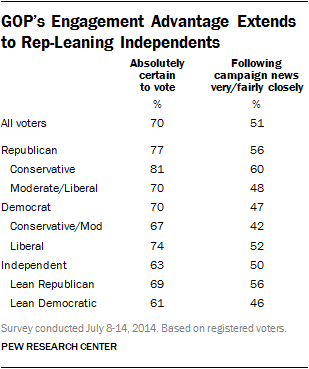
However, while Republicans lead Democrats on key engagement indicators, their advantage is somewhat more modest than at the same point in the 2010 elections. In June 2010, Republicans were 12 points more likely than Democrats to say there were absolutely certain to vote (77% vs. 65%) and 14 points more likely to be following election news (64% vs. 50%).
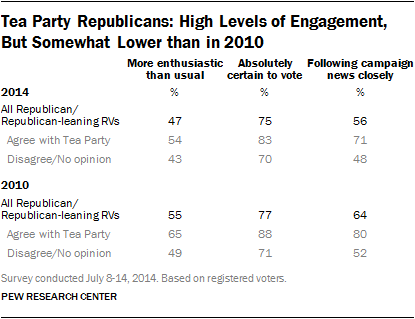
In fact, the enthusiasm of Republicans and Republican leaners who agree with the Tea Party – a group that had major impact on the 2010 elections – has dipped on some measures when compared with four years ago.
Tea Party Republicans remain highly engaged: 83% say they are certain to vote and 71% are following news about the midterms closely. Nonetheless, the percentage saying they are more enthusiastic about voting this year than in the past has declined 11 points (from 65% to 54%) and news interest is down 9 points from June of 2010 (71% today, 80% then).




